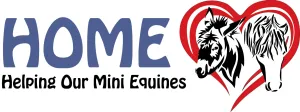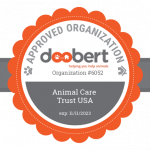 This week, on All My Children Wear Fur Coats, Lori McMaster discussed the unique aspects of caring for miniature equines and explained how Helping Our Miniature Equines works to save horses from slaughter and neglect.
This week, on All My Children Wear Fur Coats, Lori McMaster discussed the unique aspects of caring for miniature equines and explained how Helping Our Miniature Equines works to save horses from slaughter and neglect.
Lori McMaster is the CEO of Helping Our Miniature Equines, also known as HOME, an organization dedicated to rescuing unwanted miniature horses and donkeys and finding them loving, forever homes. Lori and her partner Barbara Gordon founded the organization in response to the high number of animals in Southern auctions and kill pens, coupled with the growing demand for miniature equines in the Pacific Northwest. Each of HOME’s equines receives all necessary physical and mental services including veterinary, dental, farrier, nutritional, training, and socialization. With a passionate team of up to 100 volunteers, HOME has successfully adopted out over 70 miniature equines since its inception.
According to Lori, one of the key differences in caring for miniature equines compared to full-sized horses is their metabolism. Minis are more prone to laminitis, so their diets need to be carefully managed and closely monitored. Lori explained that, depending on your location, the sugar content in your grass could be too high for miniature equines. She recommended keeping miniatures on a dry lot and restricting their grass intake to walks.
In addition to their metabolism, miniature equines have longer life expectancies compared to full-sized horses. Lori indicated that miniature horses can live up to 40 years, while miniature donkeys can live up to 50. Given their long lifespans, it’s essential to have a solid plan in place to ensure they continue to receive proper care if you’re no longer able to provide it yourself. She agreed that a pet trust would be an ideal way to protect miniatures to keep them in loving homes.
With these considerations in mind, miniature equines can make an excellent addition to your family. Lori explained that, although miniature horses cannot be ridden, they can be walked, cart-trained, trained for trail obstacles, and even participate in competitions. Known for their big personalities, miniature equines thrive when they have the company of other miniatures to keep them engaged and happy. Lori emphasized that having two of the same species is optimal, likening a horse and a donkey to two people who don’t speak the same language and struggle to communicate.
In the future, Lori hopes to dedicate more efforts to raising public awareness and educating people about miniature equines. She also hopes to expand the sanctuary at HOME, which currently provides a forever home for 12 special needs horses.
If you would like to learn more about HOME, or to make a donation, please visit HelpingOurMiniEquines.org. If you are interested in adopting a miniature equine, download an application at HelpingOurMiniEquines.org/Adopting-2. Follow HOME on social media at Instagram.com/Helping_Our_Mini_Equines.
Secure your furry friend’s future with a Pet Trust! Visit ACT4Pets.org to learn more!


